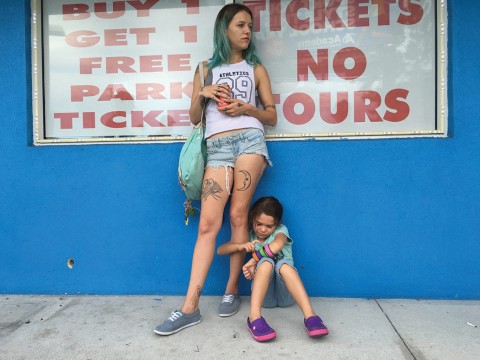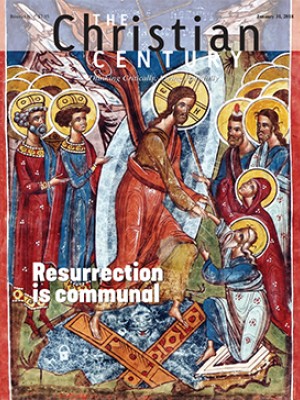Almost homeless in The Florida Project
Low-wage jobs don't stimulate communities. They just keep them afloat, transient, and in need of $38 motel rooms.

Halfway through The Florida Project, Sean Baker’s beautiful, melancholy, and inspiring new film, six-year-old Moonee takes her friend Jancey out into the swampy pastures of Kissimmee, Florida. Bewildered by seeing a herd of cattle, they bellow, “Mooo!!!” and giggle at the sound. “See, I took you on a safari,” Moonee says—another one of her accomplishments during her many unsupervised trips off the main highway. This momentary experience—much like the quilt of strangers that has brought them together—is authentic and inspiring and magical.
In other words, it is a fulfilling substitute for Animal Kingdom, the Disney attraction for which parents shell out so their kids might have the same kind of experience in a more contrived environment. Moonee (Brooklynn Prince), the film’s hero—or, more accurately, its princess—will never have the chance to compare the two experiences. She lives with her mother, Halley (Bria Vinaite), in the Magic Castle, a roadside, extended-stay motel that shelters similar families scraping to get by on the outskirts of Orlando. Halley struggles to find steady work along the strip, hustling tourists when she can and illegally selling cheap perfume outside country clubs. Unattended and independent, Moonee takes pleasure in back-alley fun: spitting on cars, wandering through abandoned, candy-colored housing projects, and asking visitors for ice cream money.
Read our latest issue or browse back issues.
Moonee and her mother represent a rarely portrayed population living in poverty—the almost-homeless. Baker’s film, which he cowrote with Chris Bergoch, resists condescension or pity, and refuses to cast people as heroes or villains.
In Orlando, in the shadows of Disney’s glow, the average job pays less than in most major metropolitan areas in America, and there’s a desperate need for affordable housing. Only 18 rental units are available for every 100 low-income families, according to the National Low Income Housing Coalition. The majority of low-wage jobs come from the tourism industry, which pays employees barely enough to cover the average cost of rent.
But Orlando is not unique. Not far away, low-income residents in Mississippi face similar issues. Research conducted by NLIHC shows that to afford rental housing in the state, a Mississippian must earn more than double the minimum wage. Residents must work several hours more than the standard 40-hour work week to afford rental homes at fair market rent. Even for those eligible for federal assistance, the government doesn’t guarantee housing, and wait lists and housing vouchers can take an extremely long time to process. The red tape can seem never-ending.
In many states, politicians boast of job growth in press releases, even though most of the growth is in low-wage jobs, which don’t stimulate communities so much as keep them afloat, transient, and in need of $38 motel rooms of the kind Halley and Moonee rent.
“We think of homeless people as literally on the street or packed in shelters in metropolitan areas,” Baker said in a recent interview with Relevant magazine. “I honestly did not know there were hundreds of thousands of them living in budget hotels. And the recession of ’08 has had a very lasting effect on many communities throughout the United States, and in particular Orlando and Kissimmee.”
People in these communities rely on charity and faith-based organizations to make ends meet. During filming, Baker was introduced to a Christian nonprofit, the Community Hope Center, which works with churches in and around Florida’s Osceola County. According to its website, the program “is intended to provide gap services to clients that other agencies are not currently providing,” restoring dignity and self-sufficiency to those in need.
There are glimpses of this kind of aid in The Florida Project, when food delivery vans from a local church swing by each week and hand out packages of bread and canned foods. And there are Good Samaritans, too, such as Bobby (Willem Dafoe), the Magic Castle’s watchful manager and proxy parent to the stable of unattended children living in his units. He is aware of his residents’ circumstances and carefully helps them to check in and out of different rooms each month so that the motel’s owner will think they are guests, not permanent fixtures.
In a recent study by Child Trends, homeless students living in motels increased by 60 percent over a seven-year span starting in 2006, making up around 6 percent of the entire 1.4 million homeless student population. In the summer, when the film takes place, this population puts single parents into precarious situations. Most of them rely on other tenants to run makeshift daycares as they attend their jobs or try to find them.
They also rely on the compassion of people like Bobby, who is combination motel manager, social worker, psychologist, and probation officer. Bobby knows that most of the single mothers living at the motel have wages that barely cover their needs. He knows his guests may be late in paying and that their income is not steady or may come from shady methods. He also will report guests to social services if need be.
In the film, Halley’s friend waits tables at a Waffle House while Bobby keeps an eye on her son, who gets into frequent trouble with Moonee. As part of an unspoken arrangement, Moonee comes to the back of the restaurant to pick up dinner.
One of the central ironies of the film is that the people who have the least to give are also the most generous with their time and money. They constitute a patchwork society whose members watch out for one another. The Florida Project, in some ways, functions as a contemporary parable of the widow’s offering, highlighting the dignity and compassion that those floundering in the margins find within themselves each day. Moonee and Halley make decisions that will provoke the viewer’s anger, but they also make decisions that restore belief in the kindness of people.
It is easy to believe that the poor are always sad, that their expressions never lift higher than a frown, and that their status in life is a product of pure, if badly considered, choice. The Florida Project rejects these misguided assumptions. It does not propose policies, but it demonstrates their consequences. Baker makes the case that hearts must change before minds.
A version of this article appears in the January 31 print edition under the title “Almost homeless.”






